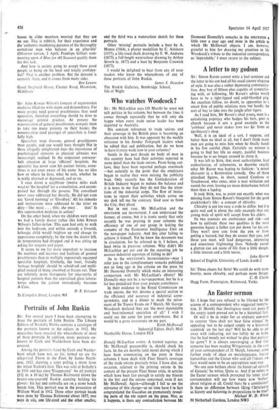Sir: John Rowan Wilson's forecast of supermarket medicine filled me
with alarm and despondency. Far more people need general practitioners than need specialists, therefore everything should be done to encourage general practice. At present the remuneration of general practitioners compels them to take too many patients on their books; the remuneration (and prestige) of speciblists is fanci- fully high.
Specialists treat diseases, general practitipners treat people, and one would have thought ihat in these allegedly enlightened days the importance of psychological elements in physical ailments was increasingly realised. In the outpatient conveyer- belt situation at large 'efficient' hospitals, the specialist has never seen his patient before, some- times is not even aware of his name has no idea how or where he lives, what he eats, whether he is really alarmed or depressed, and so on.
I once drove a neighbour (twelve miles each way) to 'the hospital' for a consultation, and accom- panied her through the process. The consultant never once addressed her directly. He did npt even say 'Good morning' or 'Goodbye.: All his remarks and instructions were addressed to the sister on
duty—'She must . . . this; she must . that.' Is this supermarket medicine in action?
On the other hand, when my children were small we had a family doctor rather like John Rowan Wilson's father-in-law. This man had only to walk into the bedroom, and within seconds a feverish, lethargic child would brighten up and change its appearance completely; by the time the doctor left, its temperature had dropped and it was sitting up asking for crayons and paper.
It seems to me far more important to increase the numbers and incomes and facilities of general practitioners than to multiply expensively equipped specialist hospitals. Similarly, the local, friendly 'cottage hospitals' should be subsidised and multi- plied instead of being absorbed or frozen out. They are infinitely more therapeutic for nine-tenths of hospital patients than the centralised glass labora- tories where the patient immediately becomes A Case.






























 Previous page
Previous page